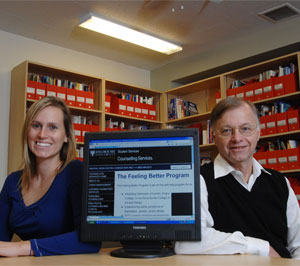 |
| Susan Battista and Victor Day launched the Feeling Better Program. (Danny Abriel Photo) |
Feeling stressed, depressed or anxious?
Dalhousie’s Counselling Services is test driving a new program called Feeling Better to help students with these problems.
It’s an online self-help program that takes a cognitive behavioural therapy approach.
Although students can already receive individual counselling and participate in group therapy through Dalhousie’s Counselling and Psychological Services, a program such as Feeling Better has different benefits.
“There are a variety of needs for this,” explains Victor Day, director of the Counselling and Psychological Services Centre. “There are the people who just want something for a mild range of problems. There are some people who by choice don’t want to come for individual personal counselling. And there are the people who can’t.”
That’s where Feeling Better comes into play.
“From cognitive behavioural perspective, there are two main things to helping a person overcome a problem. One is helping them think differently, and the other is helping them learn different ways of behaving,” says Dr. Day.
“For example, a person with an anxiety problem is often thinking of things as being more dangerous than they really are; so changing that thought is important. Also, people tend to avoid things they fear, and so the other part of the solution is to helping people get over their habit of avoidance. A student with social anxiety, for instance, may be overestimating the likelihood of being ridiculed or rejected, and so avoids talking to new people.
Through the program, students will learn to clarify their worst thoughts, then examine and change them. They can also learn methods of relaxation and work on gradual exposure to whatever is causing their anxiety, which will eventually eliminate that anxiety.
“It’s interactive, not just informative. It’s more like an online workbook in which people fill out questionnaires that help clarify the nature of their problem, whether it’s anxiety, depression or stress; and then plan relevant activities to try,” he says.
Feeling Better takes one or two hours per week, with weekly telephone or e-mail monitoring and program assistance from a project coach. Overall, Feeling Better takes approximately two months to fully complete.
Students will be screened for the program. They cannot have certain psychological problems that are more serious, such as psychosis, addiction problems, manic depression, eating disorders or suicidal thoughts or intent.
Also, if students find Feeling Better insufficient they will most likely be referred to Counselling Services.
“There are built-in ways within the program in which we will be able to look at which modules (students) find particularly helpful,” adds Susan Battista, the Feeling Better program coordinator and coach. “They also have the option to provide feedback with each module.”
Dr. Day says it was quite time consuming to design the content of the program.
“You have to figure out how it’s going to interact with people, you have to anticipate different responses people may have and you have to figure out what would be the best sequence.”
Students interested in the Feeling Better program can find it at www.counsellingservices.dal.ca
